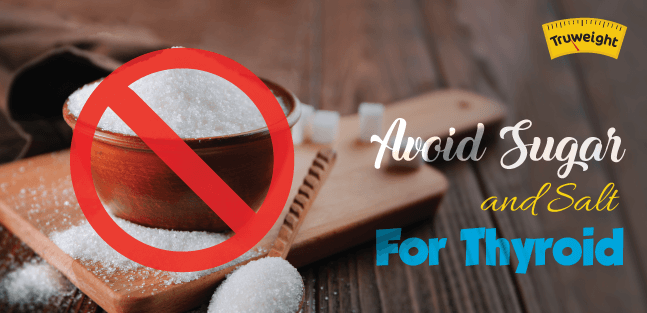Disease, Food & Nutrition
Foods to Avoid When You Have Thyroid Disorder | Possible
Medically reviewed by Shanmukha Priya, M.Phil and Ph.D. in Food Science and Nutrition
Thyroid diet is an important part of overall thyroid treatment and maintenance. Medications alone cannot get rid of your thyroid problem.
Keeping a watch on what to eat and what to avoid is necessary for preventing flare or dip in thyroid levels. Compounds present in different food item can affect the functioning of the thyroid.
Thyroid conditions may either result in excessive thyroid hormone secretion or underproduction of thyroid hormones.
Know your thyroid gland | Foods to avoid | What makes the right thyroid diet
Thyroid hormone is involved in every important body functions, be it growth, metabolism or reproduction.
This requires you to be extra careful towards your thyroid health. Thyroid health improvement depends greatly on your food intake.
If you are suffering from hyperthyroidism, your endocrinologist may suggest you follow the overactive thyroid diet.
This involves eating food that suppresses thyroid production and avoiding foods which can aggravate thyroid flare up.
Similarly, an under-active thyroid diet will include thyroid stimulating foods, minus foods which can further reduce thyroid activity.
Understanding the different thyroid disorders and the role of the thyroid diet chart for each condition will help you to get a grasp of the recovery process.
Know Your Thyroid Gland
The thyroid is a tiny endocrine gland, situated in the front of your neck. It performs regulatory functions in various systems of your body and keeps harmony among all functions.
This butterfly-shaped gland releases thyroid hormones to achieve all the functions. Thyroid gland absorbs Iodine and combines it with amino acids to make thyroid hormones. It also releases a peptide hormone.
The entire system is regulated by a feedback mechanism involving your brain.
Low levels of T3 and T4 in the blood signals the hypothalamus to release TSH Releasing Hormone.
This stimulates the pituitary gland to release Thyroid Stimulating Hormone which acts on the thyroid gland and directs the release of more hormones.
There are various factors and conditions which may trigger thyroid malfunction, resulting in an overactive or underactive thyroid.
| Thyroid Disorder | Reasons | Description |
| Hyperthyroidism | Grave’s Disease | An autoimmune disorder which constitutes 70% of hyperthyroidism cases. Symptoms are Ophthalmopathy, weight loss, goitre, restlessness, rapid pulse. |
| Thyroid Nodules | Benign extra mass on the thyroid gland can result in extra thyroid secretion. Can be big enough to cause a swelling. | |
| Thyroid cancer | The rare cancerous growth of thyroid tissue leading to an overactive thyroid. | |
| Thyroiditis | Mostly occurs after pregnancy and results in painful inflammation of the thyroid. Causes leakage of excess thyroid hormone. | |
| Pituitary malfunction | A rare cancer of the pituitary glands can cause the thyroid to produce hormones in excess. | |
| Hypothyroidism | Hashimoto’s Thyroiditis | An autoimmune disorder which results in the destruction of thyroid tissues and diminishing thyroid production. |
| Goitre | Iodine deficiency is the major cause of thyroid swelling. Mostly associated with hypothyroidism. But it is also seen in cases of an overactive thyroid. | |
| Postpartum thyroiditis | This disease alternates between underactive thyroid and hyperactive thyroid phase. | |
| Radioactive thyroid treatment | Irreversible hypothyroidism can be caused after radioactive iodine treatment for curing hyperthyroidism |
Avoid these foods if you have a thyroid disorder

You can help or hurt your thyroid problem by what you eat. Thyroid triggers may not be under your control, but facilitating healing by avoiding intake of food that can hurt you is.
Following the thyroid diet with caution can save you from further complications during and after thyroid treatment. Click here for a free sample thyroid diet chart.
Overactive thyroid diet excludes consumption of following:
Seafood
Seafood like fish, shellfish and seaweed are a big no if you suffer from hyperthyroidism. These contain iodine, which can result in excessive thyroid production.
Iodized salt
Iodized salt can worsen hyperthyroidism by providing extra iodine for thyroid production. Low sodium salt without iodine can be used to bring down thyroid levels.
Foods with enriched flour and refined sugar
Enriched flour has a high glycemic index and can spike blood glucose levels and release insulin followed by cortisol.
Cortisol weakens the adrenal glands, which in turns triggers thyroid rush (2). So avoid white flour, low fibre food, and sugary sweets.
Dairy
Presence of growth hormones and antibiotics in dairy can alter your endocrine system. This can add pressure on an already overworking thyroid.
Caffeine and alcohol
Both caffeine and alcohol can aggravate overactive thyroid symptoms by hay wiring your nervous system and cause dehydration. Hence tea, coffee,caffeinated drinks, and booze should be completely avoided.
Other foods that can worsen hyperthyroidism symptoms are hydrogenated vegetable oils, nuts like peanuts, pecan and cashews, soy-based products and red meat.
If you are following underactive thyroid diet, your doctor may ask you to avoid the following foods:
Goitrogenic vegetables
Certain cruciferous vegetables like cabbage, turnip, cauliflower, and broccoli contain goitrin, a compound which hampers the activity of enzyme thyroid peroxidase.
This enzyme is necessary for coupling iodine with tyrosine. Without its activity, thyroid production goes down even in presence of iodine and a visible goitre is formed.
Vegetables with thiocyanates
Bamboo shoots, cassava, corn and cruciferous vegetables contain thiocyanates which prevent entry of iodine into the thyroid gland (3). Without iodine, no thyroid hormones are synthesized and hypothyroidism becomes profound.
Soy products and millets
Both contain flavonoids that interfere with thyroid peroxidase activity (3).
Grains with gluten
Gluten protein, found in wheat, rye, and barley is deadly for patients with Celiac’s disease. Interestingly, patients with Hashimoto’s thyroiditis are mostly inflicted with Celiac’s disease since both are autoimmune disorders (5).
Low fibre foods
Highly processed foods are low in fibre and high in carbohydrates and fats. This can increase hypothyroidism weight gain and weigh down the metabolism further.
What makes the right thyroid diet
Foods which should be included in the thyroid diet are decided by your thyroid condition.
| Hyperthyroidism | Hypothyroidism |
| Low sodium salt without Iodine | Iodized salt |
| Low sugar, high fibre food | Gluten free, low sugar, high fibre food |
| Yoghurt | Probiotics, low-fat dairy |
| Cooked vegetables including cruciferous vegetables | All vegetables except cruciferous vegetables |
| Vitamin D and Omega 3 rich food | Selenium and Zinc rich food |
QUICK BYTES
Should soy products be totally avoided by the hypothyroid patient?
Not necessarily. Unprocessed soy food can be consumed in moderation.
Can thyroid diet cure thyroid disorder?
No. Thyroid diet is a supportive therapy to aid in thyroid healing.
Can kelp be taken for curing iodine deficiency?
No. Seaweed contains huge amounts of iodine per gram. So it may result in excess iodine intake than recommended.
Why is radioactive iodine given to hyperthyroid patients?
Radioactive iodine destroys thyroid cells and results in low thyroid release. This helps in treating overactive thyroid.
How are hypothyroidism and weight gain related?
Lower fat oxidation and accumulation of salt and water in muscles contribute to hypothyroidism weight gain.
